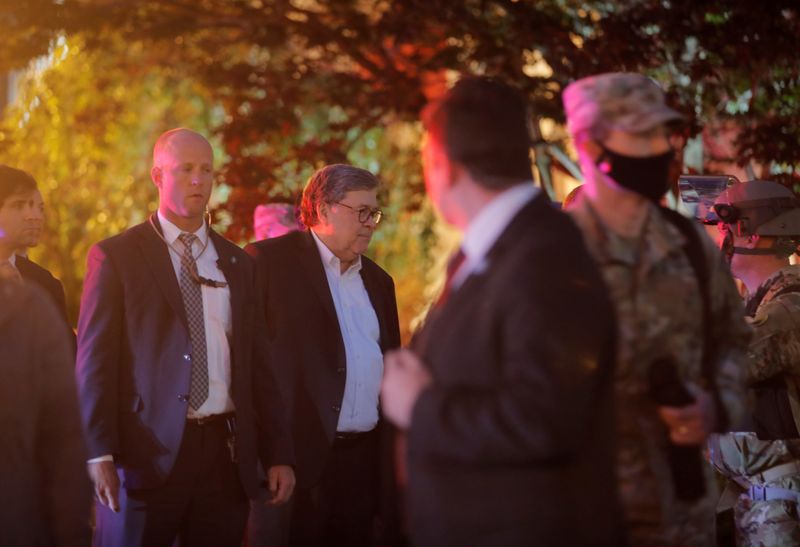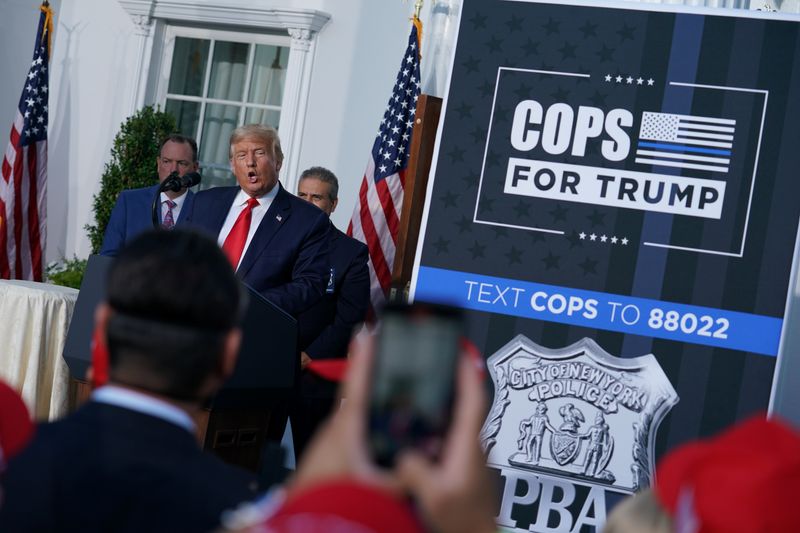By Sarah N. Lynch
WASHINGTON (Reuters) - Before a U.S. federal judge on Thursday halted the work of a Trump administration law enforcement commission - saying it had violated public meetings laws - the panel had been warned about shutting out public input by several of its own participants, internal records reviewed by Reuters show.
The commission had planned to deliver a slate of proposals recommending sweeping new powers for police shortly before the November presidential election, the documents show. It also called for bolstering due-process protections for officers accused of wrongdoing, according to draft proposals reviewed by Reuters.
But the secretive process to produce the planned report drew criticism from some law enforcement representatives helping draft the document, internal emails among the participants show. The order to halt the commission's work, from U.S. District Judge John Bates, came in response to a lawsuit filed by the NAACP Legal Defense and Educational Fund (NAACP LDF) alleging the commission failed to give notice of public hearings and allowed law enforcement groups to have undue influence.
The panel's 18 commissioners include federal, state and local law enforcement representatives, but no civil rights advocates, defense attorneys or big-city police officials.
Among the participants who warned the panel about its closed process was Fayetteville, North Carolina Police Chief Gina Hawkins (NASDAQ:HWKN), a commission member. In an May 11 email reviewed by Reuters, she told commission chairman Phil Keith that drafting recommendations without hearing from all sides created the appearance of a predetermined conclusion.
Then on Aug. 13, she complained the draft contained too many quotes from Trump and Barr, rather than experts who provided input to the commission, saying the work "should never be political."
Hawkins declined to comment. Keith did not respond to a request for comment.
Justice Department spokeswoman Kristina Mastropasqua said that Keith acknowledged Hawkins' question and told her that the reports would not be final until all testimony was received.
Two local prosecutors assigned to smaller working groups that support the commission - John Choi of Ramsey County, Minnesota, and Mark Dupree of Wyandotte County, Kansas - wrote to the panel on May 29 expressing concern its recommendations would not sufficiently address "racial disparities in policing" and would "erode local prosecutorial discretion."
Choi has since asked for his name to be removed from the final report. He told Reuters the commission declined to give him access to recommendations being crafted by other working groups. Dupree did not respond to a request for comment.
The White House declined to comment on the panel's work or the court ruling, referring questions to the Justice Department.
Prior to Judge Bates' ruling on Thursday, Mastropasqua declined to comment on other aspects of the commission's work or the draft proposals reviewed by Reuters. Department spokeswoman Kerri Kupec declined to comment on the ruling after it was issued.
In unveiling the panel last year, Trump foreshadowed that it would produce a report that would be applauded by law enforcement. He told a conference of the International Association of Police Chiefs (IACP) in that the administration would begin immediately implementing the commission's best recommendations once it issued them.
"They'll have them soon," he said, "because most of them already know many of the answers before they begin; you understand that."
LACK OF ALTERNATIVE INPUT
Concerns about systemic racism in policing were not addressed in any of the draft sections of the document seen by Reuters.
The lack of diverse viewpoints prompted the NAACP LDF to sue the commission, Barr and top commission members, accusing them of violating the Federal Advisory Committee Act (FACA) by not providing notice of public hearings and stacking it with only law enforcement officials.
The government denied the civil rights group access to "a representative voice on the Commission," Bates wrote in his ruling on Thursday. The court ordered the panel to halt work and provide timely notice of meetings, and ordered Barr to appoint a federal official to ensure that the commission has a "fairly balanced membership." Bates barred the commission from publishing a report until it had complied with federal open meetings and transparency laws.
Amid complaints about a lack of diverse input, the commission actively sought the opinions of law enforcement insiders, commission records reviewed by Reuters show.
Tim Richardson, the lobbyist for the Fraternal Order of Police, the largest organization of sworn law enforcement, is not publicly named as a member of any group working on the draft. But an April 10 email reveals he was introduced as a member of a group developing the "Respect for Law Enforcement" chapter to others working on the chapter. His comments are cited in the footnote of an August draft to support a recommendation urging Congress to craft "a uniform minimal level of procedural due process" for police.
Richardson did not respond to requests for comment. The Justice Department said in court papers Richardson was not a member of the working group but was retained as an expert.
PROPOSING NEW POLICE POWERS
Draft proposals from the commission, obtained by Reuters through public records requests, offer a window into how Trump's Justice Department views the role of the law enforcement amid a national upheaval over police killings of Black men and women.
The commission started its work before the May killing of George Floyd in Minneapolis, which sparked nationwide protests against racism and police brutality. Attorney General William Barr in January said the commission would recommend best practices at a time when "criminal threats and social conditions have changed the responsibilities and roles of police officers."
The proposals included allowing officers accused of wrongdoing to view body camera footage before speaking to internal investigators; increasing funding for controversial facial recognition technologies; giving police access to encrypted cell phones; and increasing penalties for illegal immigration.
The draft recommendations also take aim at "progressive prosecutors" who advocate for eliminating cash bail and not charging low-level drug offenses.
Other recommendations urged Congress to bolster due process protections for police officers accused of wrongdoing and call on the Justice Department to regularly affirm support for "qualified immunity," a Supreme Court precedent that protects officers accused of injuring or killing suspects in civil lawsuits.
Many of the proposals calling for legislative action likely would not win support from a House of Representatives controlled by Democrats.
SECOND-GUESSING PROSECUTORS
An August chapter draft made multiple recommendations reflecting the administration's concerns that some locally elected prosecutors are going too easy on low-level offenders, such as those accused of marijuana possession. Among the proposed reforms including calling on states to establish oversight committees to review charging decisions.
"When a prosecutor unilaterally decides to not prosecute an entire category of crimes ... that prosecutor is usurping legislative authority," it says.
A draft chapter on technology calls for increased funding for facial recognition technologies, though a government-funded study last year found had higher rates of error in identifying African-American and Asian faces.
The draft also recommends a legislative fix to address recent concerns by the FBI, after it struggled to access the encrypted iPhone of a Royal Saudi Air Force trainee who killed three American sailors in a December attack at a U.S. naval base.

"Companies are building electronic devices and platforms that apply 'warrant-proof' encryption," a June draft chapter reads. "Those companies are blinding the nation to preventable attacks."
